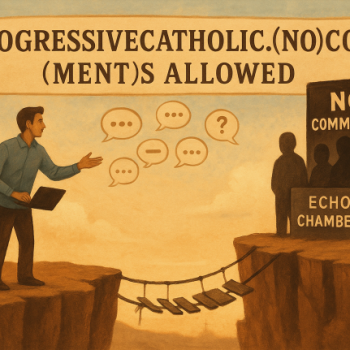GODSTUFF:
THE LONG AND WINDING ROAD . . . TO GOD?
Forty years ago, a young English pop singer said something that sparked such a cultural hullabaloo among many religious Americans that it makes the recent reaction to Madonna’s strapping herself to a disco-ball-glittery crucifix seem like a collective shrug.
In August 1966, an American magazine published a portion of a newspaper interview John Lennon of the Beatles had given a British journalist months earlier wherein the topic of religion — Christianity in particular — arose.
“Christianity will go,” Lennon said. “It will vanish and shrink. I needn’t argue about that; I’m right and I will be proved right. We’re more popular than Jesus now; I don’t’ know which will go first — rock ‘n’ roll or Christianity. Jesus was all right but his disciples were thick and ordinary. It’s them twisting it that ruins it for me.”
There was more that came before and after Lennon’s characteristic lipping-off about whatever was on his mind. But as many of you know, the only thing anyone paid attention to when his comments were published in the States and pricked the ire of a couple of DJs in Birmingham, Ala., was:
We’re more popular than Jesus.
The backlash was passionate and immediate. Radio stations boycotted playing Beatles records. Stores refused to carry their albums. Bonfires were organized to burn Beatles records, books and posters. Preachers preached against the Fab Four, and the band’s 15-city U.S. summer tour — the Ku Klux Klan in Memphis threatened to disrupt the Beatles concert there because it believed Lennon had insulted Jesus — was in jeopardy.
So on Aug. 11, 1966, the day before their concert at Chicago’s International Amphitheater, Lennon and his bandmates met the press in a downtown hotel so the “literary Beatle,” as he was known, could apologize. Lennon didn’t want to — he even broke down sobbing before meeting with the press, according to the fascinating new book The Gospel According to the Beatles by long-time rock journalist Steve Turner — but eventually he said he was sorry for what he’d said. Sort of.
Here’s a portion of the transcript from that 1966 Chicago press conference:
Q: “Some teenagers have repeated your statements — ‘I like the Beatles more than Jesus Christ.’ What do you think about that?”Lennon: “Well, originally I was pointing out that fact in reference to England — that we meant more to kids than Jesus did, or religion, at that time. I wasn’t knocking it or putting it down, I was just saying it as a fact. And it’s sort of… It is true, ‘specially more for England than here. I’m not saying that we’re better, or greater, or comparing us with Jesus Christ as a person or God as a thing or whatever it is, you know. I just said what I said and it was wrong, or was taken wrong. And now it’s all this.”
In The Gospel According to the Beatles, Turner theorizes that the Beatles vs. Jesus incident marked a kind of cultural turning point, when music fans — young people in particular — started to pay attention to what their favorite musicians were saying about their religious or political beliefs as closely as they followed their fashion and hairstyles.
It’s a phenomenon that continues today, and may explain why fans of artists such as U2, the Dixie Chicks, Wycliffe Jean or the Beastie Boys seem to care as much about what they say (on and off stage) as what they sing.
Lennon is the granddaddy of cultural collisions like the one last year, when Chicago’s own Kanye West lost his cool on national TV during the Hurricane Katrina telethon and said President Bush didn’t care about black people.
Sure a lot of Americans said, “Kanye who?” and went about their business unfazed. But a lot of people didn’t and responded with a chorus of “Amen — tell it’s,” or a litany of invectives against the hip-hop star (who also happens to be an outspoken, self-described Christian).
Lennon’s 1966 Jesus commentary also marked a period of spiritual exploration and experimentation for all of the Beatles that is reflected in their later albums. For many of a certain generation, the four lads from Liverpool served as spiritual tour guides.
Whether it was Eastern mysticism, the Maharishi and his Transcendental Meditation, LSD and opening the doors of perception, Krishna or Mother Mary, they went out and discovered new things and dutifully reported their findings in their music.
Like so many of his contemporaries (and like so many young people in the generation or two since), Lennon abandoned the religion of his youth during his late teen years and went looking for something more “real.” Whether he found it is a matter of speculation.
The last thing Lennon is known to have said about his own spiritual journey, in a letter to his cousin, was that he was a “Zen pagan,” Turner said. “But he was continually returning to, checking out and bothered by Jesus.”
So, what is the gospel according to the Beatles? Turner didn’t use the term “gospel” in its Christian, biblical sense, but he did intend it to mean the Beatles’ “message,” their “good news.”
“They talk about people being blind, about not seeing, about misunderstanding,” Turner said. “Free your mind . . . the kingdom of heaven is within.”
Or, as Paul McCartney wrote in “Blackbird”:
Blackbird singing in the dead of night
Take these sunken eyes and learn to see
All your life
You were only waiting for this moment to be free.
Copyright © The Sun-Times Company
All rights reserved. This material may not be published, broadcast, rewritten, or redistributed.














